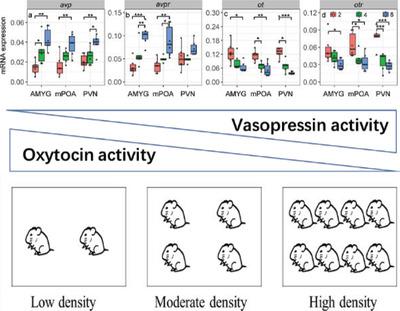当前位置:
X-MOL 学术
›
Integr. Zool.
›
论文详情
Our official English website, www.x-mol.net, welcomes your feedback! (Note: you will need to create a separate account there.)
Density‐induced social stress alters oxytocin and vasopressin activities in the brain of a small rodent species
Integrative Zoology ( IF 3.3 ) Pub Date : 2020-07-11 , DOI: 10.1111/1749-4877.12467 Shuli Huang 1, 2 , Guoliang Li 1, 2 , Yongliang Pan 1, 3 , Mingjing Song 4 , Jidong Zhao 1, 2 , Xinrong Wan 1 , Charles J Krebs 5 , Zuoxin Wang 6 , Wenxuan Han 7 , Zhibin Zhang 1, 2
Integrative Zoology ( IF 3.3 ) Pub Date : 2020-07-11 , DOI: 10.1111/1749-4877.12467 Shuli Huang 1, 2 , Guoliang Li 1, 2 , Yongliang Pan 1, 3 , Mingjing Song 4 , Jidong Zhao 1, 2 , Xinrong Wan 1 , Charles J Krebs 5 , Zuoxin Wang 6 , Wenxuan Han 7 , Zhibin Zhang 1, 2
Affiliation

|
It is known that social stress could alter oxytocin (OT) and arginine‐vasopressin (AVP) expression in specific regions of brains which regulate the aggressive behavior of small rodents, but the effects of density‐induced social stress are still unknown. Brandt's voles (Lasiopodomys brandtii) are small herbivores in the grassland of China, but the underlying neurological mechanism of population regulation is still unknown. We tested the effects of housing density of Brandt's voles on OT/AVP system with physical contact (allowing aggression) and without physical contact (not allowing aggression) under laboratory conditions. Then, we tested the effects of paired‐aggression (no density effect) of Brandt's voles on OT/AVP system under laboratory conditions. We hypothesized that high density would increase aggression among animals which would then increase AVP but reduce OT in brains of animals. Our results showed that high housing density induced more aggressive behavior. We found high‐density‐induced social stress (with or without physical contact) and direct aggression significantly increased expression of mRNA and protein of AVP and its receptor, but decreased expression of mRNA and protein of OT and its receptor in specific brain regions of voles. The results suggest that density‐dependent change of OT/AVP systems may play a significant role in the population regulation of small rodents by altering density‐dependent aggressive behavior.
更新日期:2020-07-11


























 京公网安备 11010802027423号
京公网安备 11010802027423号